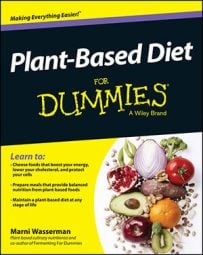Although it sounds simple, feeling good is really important. When you don’t feel good, all other aspects of your life get out of balance — you can’t be your optimal self, either personally or professionally. Luckily, you have an ace up your sleeve: proper nutrition. You have control over your diet every day, and you can choose what goes into your mouth.
Choosing a plant-based diet can be extremely powerful in your quest to stay healthy. You may find that after you make the switch to this diet, you start to feel better, lose weight, have more energy, and sleep better.
Weight management
Changing over from animal foods to plant foods means you consume far less saturated fat and fewer dense calories that can lead to weight gain. The calories and nutrients that come from plant-based foods do so much more for you, in terms of helping with metabolism and many functions in the body.
By eating more fiber and nutrient-dense foods, you generally don’t eat as much in one sitting. This may encourage you to eat more frequent meals, which is incredible for weight loss. Meat and dairy products are heavy and filled with saturated fat, and they pack on the calories. A plant-based diet is lean and efficient, preventing you from taking in food that just turns into fat.
People sometimes get hung up on the fact that following a plant-based diet means consuming more carbohydrates. That may be true, but it doesn’t necessarily mean you’ll gain weight.
The key is to choose carbs that are high in fiber and contain lots of other nutrients. Your body will digest them well and use them for energy. You gain weight from carbs when you eat beyond your needs or you eat carbohydrates made from refined grains.
When eating a plant-based diet, be sure to choose complex carbs (such as quinoa, sweet potatoes, apples, and rolled oats) that are rich in vitamins, minerals, and protein, and enjoy them in moderation. Stay away from simple carbs (such as sugars, breads, and pastas made with refined grains). If you follow those general guidelines, you can still reach your weight goals.
Energy and vitality
Within days of consuming more green, leafy veggies and fruits, you’ll feel more energized. This is a result of the water content of these foods, which hydrates your body, providing your cells with more oxygen (as compared to meat), and it’s also because of the life force running through these foods.
They’re filled with vitamins and minerals that infuse directly into your blood system, helping your body detoxify and rejuvenate itself. Heavy animal-based foods, such as meat and dairy, can weigh you down, decrease your energy, and make you tired. Plant-based foods are lighter and easier to digest.
Better sleep quality
When you eat better, you sleep better. When you nourish your body during the day with regular plant-based meals, you may find, in time, that the quality of your sleep is better. Many plant foods, such as green, leafy vegetables that are rich in magnesium and calcium, can help the body relax for a peaceful sleep.
Other plant-based foods, such as whole grains, help the body produce serotonin, which has a calming effect on the body. Eating a plant-based diet doesn’t necessarily mean you get more sleep — just better sleep. In fact, you may find that you need less sleep.
If you have problems sleeping, try having a banana, some oatmeal, or some almond butter on toast. These foods tend to help the body and the nervous system relax at night by causing the body to release the hormones required for a restful sleep. You can also try drinking herbal tea, such as chamomile, kava root, or valerian root, because it has a sedative effect on the body and can aid in falling asleep.

